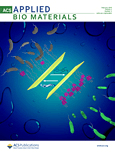
International Journal of Nanomedicine
Scope & Guideline
Advancing healthcare through nanomedicine innovation.
Introduction
Aims and Scopes
- Nanotechnology in Cancer Therapy:
The journal consistently explores the application of nanotechnology in cancer treatment, focusing on drug delivery systems, targeted therapies, and the development of novel nanomedicines that enhance the efficacy and reduce the side effects of existing treatments. - Nanomaterials for Drug Delivery:
A significant emphasis is placed on the design and optimization of nanocarriers, including liposomes, nanoparticles, and nanogels, that improve the bioavailability and therapeutic efficacy of drugs, particularly in challenging conditions like cancer and chronic diseases. - Biomaterials and Tissue Engineering:
Research on biomimetic materials and their applications in tissue engineering is a core area, with studies highlighting the potential of nanostructured materials to promote healing, regeneration, and integration with biological tissues. - Diagnostics and Imaging:
The journal also covers advancements in nanotechnology for diagnostic applications, including imaging agents and biosensors that utilize nanomaterials to enhance detection sensitivity for various diseases. - Extracellular Vesicles and Nanomedicine:
A growing focus is on the therapeutic potential of extracellular vesicles derived from stem cells and their role in drug delivery and regenerative medicine, showcasing innovative approaches to harness these biological nanocarriers.
Trending and Emerging
- Combination Therapies:
There is a growing trend towards the development of combination therapies that integrate various modalities, such as photothermal, photodynamic, and immunotherapy approaches, to enhance the overall efficacy of cancer treatments. - Smart and Responsive Nanocarriers:
Research is increasingly focused on smart nanocarriers that respond to specific stimuli (e.g., pH, temperature, or light) for controlled drug release, improving the precision of therapeutic interventions. - Nanoformulations for Chronic Diseases:
Emerging studies are exploring the application of nanotechnology in chronic disease management, including diabetes and neurodegenerative diseases, highlighting the potential of nanomedicine to address long-term health challenges. - Extracellular Vesicles in Drug Delivery:
The use of extracellular vesicles as nanocarriers for drug delivery is an emerging focus, driven by their natural biocompatibility and ability to target specific cells, making them a promising avenue for future research. - Personalized Nanomedicine:
The concept of personalized medicine is gaining traction, with research focusing on tailoring nanomedicine approaches to individual patient profiles, enhancing treatment efficacy and minimizing adverse effects.
Declining or Waning
- Traditional Chemical Synthesis Methods:
There has been a noticeable decline in studies relying solely on conventional chemical synthesis methods for nanomaterial production, as researchers increasingly favor greener and more sustainable approaches, such as biogenic synthesis. - General Antibacterial Applications:
Research focused solely on the antibacterial properties of nanomaterials, without specific applications in targeted therapies or complex disease models, appears to be waning as the field moves towards integrated approaches that address multiple therapeutic needs. - Non-Targeted Drug Delivery:
The emphasis on non-targeted drug delivery systems is decreasing, with a shift towards more sophisticated, targeted nanocarriers that enhance efficacy by specifically addressing the tumor microenvironment or other disease-specific markers. - Standalone In Vitro Studies:
There is a reduced frequency of standalone in vitro studies, as the journal increasingly favors research that includes in vivo validation or clinical relevance, demonstrating the effectiveness of nanomedicine in real-world applications.
Similar Journals

Advanced Pharmaceutical Bulletin
Leading the Charge in Pharmaceutical Innovation and DiscoveryAdvanced Pharmaceutical Bulletin, an esteemed journal published by Tabriz University of Medical Sciences & Health Services, serves as a pivotal platform for disseminating groundbreaking research in the field of pharmaceutical sciences. Since its inception in 2011, this open-access journal has dedicated itself to advancing knowledge in pharmacology, toxicology, and pharmaceutics, boasting an impressive Q1 ranking in miscellaneous categories and Q2 in pharmaceutical science as of 2023. The journal is noted for its rigorous peer-review process, ensuring that published work meets the highest standards of scientific inquiry. With notable rankings, including 7th out of 80 in general pharmacology and toxicology, it sits in the 91st percentile, highlighting its significance in the research community. Researchers and practitioners alike can access cutting-edge findings and innovative methodologies, promoting collaboration and knowledge within the scientific community. Based in Tabriz, Iran, the journal remains committed to fostering research excellence, making it an invaluable resource for scholars and professionals eager to contribute to the dynamic field of pharmaceuticals.

Nanomedicine Journal
Shaping the Future of Medicine with Cutting-edge Research.Nanomedicine Journal, published by Mashhad University of Medical Sciences, serves as a vital platform for research and developments in the dynamic field of nanotechnology applied to medicine. With an ISSN of 2322-3049 and an E-ISSN of 2322-5904, this Open Access journal, operational since 2013, makes cutting-edge research freely accessible to encourage collaborative efforts in this rapidly evolving domain. The journal navigates various areas, including bioengineering, biomedical engineering, materials science, and pharmacology, holding prestigious rankings in categories relevant to these fields. The 2023 Scopus Rankings reveal its significant standing within the scientific community, particularly with a 76th percentile in general medicine. By bridging the gap between laboratory technologies and clinical applications, the Nanomedicine Journal aims to empower researchers, professionals, and students alike to contribute to the innovative landscape of nanomedicine. With a convergence period extending from 2019 to 2024 and an established reputation, this journal is essential for those pursuing advancements in therapeutic solutions and diagnostics through nanotechnology.

ACS Biomaterials Science & Engineering
Exploring the Boundaries of Biomaterials ResearchACS Biomaterials Science & Engineering, published by the American Chemical Society, serves as a premier platform for the latest advancements and research in the fields of biomaterials and biomedical engineering. With an impressive impact factor and a strong reputation reflected in its ranking—Q2 in Biomaterials and Q1 in Biomedical Engineering—the journal attracts a diverse and engaged readership. Since its inception in 2015, it has aimed to foster innovation by publishing high-quality research articles, reviews, and perspectives on the synthesis, characterization, and application of biomaterials. Researchers and professionals benefit from the journal's rigorous peer-review process and its focus on translational science, making it essential for those looking to stay at the forefront of biomaterials research. Located in Washington, DC, USA, the journal plays a pivotal role in connecting academic and industrial sectors, ultimately driving advancements that impact biomedicine and related fields.

ACS Applied Bio Materials
Connecting Science and Technology for Biomedical AdvancementsACS Applied Bio Materials is a leading academic journal published by the American Chemical Society, focusing on the innovative intersection of bioengineering and materials science. Since its inception in 2018, the journal has established itself as a pivotal platform for disseminating impactful research within the fields of Biochemistry, Biomaterials, Biomedical Engineering, and Chemistry, often ranked in the top tiers of these categories. With an impressive impact factor, it holds a Q2 ranking in both Biochemistry and Biomaterials, and a prestigious Q1 ranking in Biomedical Engineering and miscellaneous Chemistry, underscoring its significance in advancing knowledge and practices across these disciplines. The journal’s editorial commitment to high-quality, peer-reviewed research ensures relevance and rigor, appealing to a diverse audience of researchers, professionals, and students keen to explore breakthroughs in bio-related materials technology. The access options enhance its visibility and reach, allowing for a broader dissemination of studies that drive innovation and collaboration in biotechnology and material sciences. Located in the heart of Washington, DC, ACS Applied Bio Materials serves as a crucial resource for advancing the future of healthcare, engineering, and materials research.

Biomaterials Research
Innovating the future of biomedical engineering.Biomaterials Research, published by the American Association for the Advancement of Science, is a prominent open access journal established in 2014, dedicated to advancing the field of biomaterials. Based in the United Kingdom, this journal has swiftly become an essential platform for researchers and practitioners, offering groundbreaking insights in biomaterials, biomedical engineering, ceramics and composites, and miscellaneous medical fields. With its impressive Q1 ranking across multiple relevant categories in 2023 and its strong Scopus rankings, including a remarkable 90th percentile in the medicine category, Biomaterials Research showcases high-quality, peer-reviewed research designed to address both practical and theoretical challenges in biomaterials science. As an open access journal, it promotes wider dissemination and accessibility of research findings, crucial for fostering innovation and collaboration within the scientific community. Researchers, professionals, and students alike are encouraged to contribute, read, and engage with the latest developments in this dynamic field.

Advanced NanoBiomed Research
Advancing Knowledge in Nanomaterials and BiomedicineAdvanced NanoBiomed Research is a pioneering open-access journal committed to advancing the interdisciplinary field of nanobiotechnology, published by WILEY-V C H VERLAG GMBH. Since its inception in 2021, this journal has provided a platform for innovative research that bridges the gap between engineering, medicine, and materials science. With impressive rankings in Scopus, positioning it within the top quartiles of various categories, Advanced NanoBiomed Research aims to disseminate high-quality research that contributes to the understanding and application of nanomaterials in biomedical contexts. As it encompasses a wide scope—from applied microbiology to biomaterials—it serves as an essential resource for researchers, professionals, and students eager to explore the cutting-edge developments in the field. The journal promotes a collaborative environment where emerging ideas can flourish, ensuring that vital advancements in nanobiomedicine can be shared and built upon within the scientific community.

Materials
Exploring the frontiers of materials research with open access insights.Materials is an esteemed journal published by MDPI, dedicated to advancing the fields of Condensed Matter Physics and Materials Science. With its commitment to Open Access since its inception in 2008, the journal has made significant strides in disseminating high-quality research globally, allowing researchers, professionals, and students easy access to cutting-edge studies without financial barriers. Hailing from Switzerland, the journal has shown remarkable growth and prominence, currently ranked in the Q2 quartile in its categories according to the latest assessments, which highlights its impact within the community. As the journal converges its focus from 2008 to 2024, it aims to continually foster a robust exchange of knowledge on innovative materials and their applications, thereby supporting the evolving landscape of science and technology. With an E-ISSN of 1996-1944 and a user-friendly platform, Materials is poised to be a leading choice for scholars eager to contribute to and engage with pioneering research.

Biomaterials Advances
Elevating Biomaterials Science for a Healthier TomorrowBiomaterials Advances is a premier journal published by Elsevier, dedicated to the rapidly evolving field of biomaterials. Established in the United Kingdom, this open-access journal aims to disseminate high-quality, peer-reviewed research that explores innovative biomaterial designs and their applications in bioengineering and biomedical engineering. With an impressive 2023 impact factor reflected in its Q1 rankings across multiple categories—including Bioengineering, Biomaterials, and Biomedical Engineering—Biomaterials Advances stands out as a critical platform for scholars and practitioners faced with advancing technologies and methodologies in the realm of materials science. Covering a broad range of topics, from biocompatibility to tissue engineering, this journal provides an inclusive forum for researchers seeking to contribute to the field. Its Scopus rankings further affirm its position as a leading resource, with notable standings in Biomedical Engineering (Rank #13), Biomaterials (Rank #8), and Bioengineering (Rank #11), all within the top percentiles. Researchers and students alike are encouraged to contribute and engage with the latest findings and innovations in biomaterials through this valuable publication.

ADVANCED DRUG DELIVERY REVIEWS
Driving Breakthroughs in Drug Delivery Mechanisms.ADVANCED DRUG DELIVERY REVIEWS, published by ELSEVIER, is a leading journal in the field of pharmaceutical sciences, particularly acclaimed for its contributions to the disciplines of pharmacology, toxicology, and pharmaceutics. With an impressive 2023 Scopus rank of #1 out of 183 in its category, this journal is situated in the Q1 quartile, reflecting its high impact and the relevance of its published research. Since its inception in 1987, it has continually focused on the latest advancements in drug delivery systems, making it an indispensable resource for researchers, professionals, and students interested in the innovative developments that shape the pharmaceutical landscape. The journal aims to publish comprehensive and authoritative reviews that foster a deeper understanding of drug delivery mechanisms, technologies, and their clinical applications. Although it operates under a subscription model, the value it provides through rigorous peer-reviewed content ensures it remains an essential tool for anyone seeking to enhance their knowledge in this rapidly evolving field.

International Journal of Pharmaceutics-X
Exploring novel applications in the realm of pharmaceutics.International Journal of Pharmaceutics-X is a premier open access journal published by Elsevier, dedicated to advancing knowledge and research in the field of pharmaceutical sciences. Launched in 2019, this journal has quickly ascended to the Q1 category in the 2023 Category Quartiles, reflecting its high impact and the quality of research it promotes. With a current Scopus ranking of #49 out of 183 in the Pharmacology, Toxicology and Pharmaceutics category, this journal occupies the 73rd percentile, showcasing its significant influence within the scholarly community. Emphasizing innovative research and novel applications, the International Journal of Pharmaceutics-X offers a platform for researchers, professionals, and students to disseminate their findings, making crucial contributions to the global pharmaceutical landscape. The journal is based in the Netherlands, presenting a vibrant hub for scientific discourse and collaboration in a rapidly evolving field.